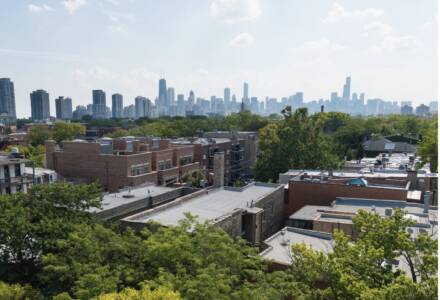Our ongoing Chicago Clean Energy Campaign focuses on clean renewable energy, building decarbonization, and electrification of transportation in order to reduce cumulative impacts and energy burden in frontline neighborhoods while increasing resilience.
Our Clean Energy Experience
-
Worked as part of the Illinois Clean Jobs Coalition for policy agenda later passed in the Climate and Equitable Jobs Act, 2021.
-
Spearheaded research and outreach in Ready for 100 Chicago Collective advocating for clean energy policy in energy generation, housing, and transportation.
-
Advocated for and effected policy changes in Chicago Climate Plan in 2022.
Our Clean Energy Campaign
-
Partner with coalitions to ramp up roof-top solar and distributed energy storage.
-
Work on building electrification with coalitions in the city of Chicago and Illinois.
-
Advocate, with ally organizations, for clean transportation such as electric buses and freight, to reduce cumulative impacts in frontline communities.
See below the results of our research and outreach as part of the Ready for 100 Chicago Collective. Our Chicago Clean Energy Campaign is based on years of research experience and engagement with diverse environmental organizations across the city of Chicago.
READY FOR 100 CHICAGO COLLECTIVE: CHICAGO CLIMATE ACTION PLAN POLICY PRIORITIES
The priorities listed here are based on input from community and environmental organizations. In November 2021, the Ready For 100 Chicago Collective shared a survey that included many policy options. We received responses from The Equiticity Racial Equity Movement, Edgewater Environmental Coalition, 350 Chicago, Environmentalists of Color, ONE Northside, Chicago League of Women Voters – Environmental Action Committee, Sunrise Chicago, The Southeast Youth Alliance, CNT, Chicago Food Policy Action Council, Faith in Place Action Fund, West Town Chamber of Commerce, Friends of the Parks, The Nature Conservancy, One Earth Collective/One Earth Film Festival, Climate Reality Project, Jobs to Move America, and Respiratory Health Association.
These policies were important priorities for a significant number of groups or were suggested by participating groups in survey responses. The top priorities in each category below are the policies that scored highest on the survey.
There are 7 categories: Buildings, Transportation, Power Generation and Renewables, Community Health, Jobs and Economy, Energy Burden, and Accountability. The category order does not designate its priority.
GOAL: Carbon neutrality and codified five-year carbon emission reduction increments into law
BUILDINGS
Top priorities
- Promote equitable electrification of existing buildings and improve its affordability with incentives, rate reform, and financing, with a priority focus on low-income residents
- Make improvements to affordable housing and public housing, including retrofits, electrification, EV chargers, and solar
- Reduce energy burden for low-income residents through expanded efficiency programs and expand retrofit programs to target small residential buildings, prioritizing LMI households
Other priorities
- Implement a strong building code, including requirements for EV and solar readiness or installation, and requiring net zero carbon construction, preferably by 2022, including addressing embodied carbon
- Require all new buildings to be all-electric, preferably by 2022
- Implement a strong building performance standard to require substantial cuts in emissions from large buildings
- Provide education and advice for residents regarding efficiency, including through a building decarbonization hub
- Offer more funding, financing, and incentives options for energy efficiency improvements, including through inclusive financing and a Green Bank
- Require regular efficiency actions, including building audits, benchmarking, and transparency, rental disclosure, retrofits, retro-commissioning, or tune-upMake improvements to municipal buildings, including efficiency retrofits, electrification, EV chargers, and solar
- Implement gas efficiency policies and comprehensive natural gas system planning while carefully scrutinizing all new investments in natural gas
- Ensure that efficiency improvements do not cause rent increases, gentrification, or displacementthrough policies such as renter protections, right to return, community preference, first right to buy, inclusionary zoning, and community land trusts
- Ensure that renters are prioritized and receive economic benefits from energy efficiency and local renewable energy
TRANSPORTATION
Top priorities
- Electrify the CTA bus fleet by 2030
- Electrify municipal fleets by 2030
- Increase CTA ridership by increasing reliability, frequency, and speed
- Implement equitable transit-oriented development
Other priorities
- Through requirements, bulk purchasing and incentives, electrify private fleets, including rideshare, delivery fleets, light freight, and school buses
- Encourage the purchase of private EVs through incentives, rebates, bulk purchasing, and low-cost financing
- Expand EV access for low-income residents through financing, car sharing, and leasing of used EVs
- Expand EV charging infrastructure, including at streetlights, in charging deserts, and in environmental justice communities
- Increase freight efficiency and plan for freight electrification
- Implement congestion pricing and create low emissions zones
- Expand public transit options through additions to train service, bus service, and an integrated CTA, Pace, and Metra system with a fully unified payment system
- Promote transit equity through lower or free fares for low-income riders and expanded service to communities of color and low-income communities
- Add new miles of dedicated bus lanes to increase speed, reliability, and on-time performance
- Expand and improve biking and walking infrastructure, including a connected network of protected bike lanes and off-street trails
- Encourage other mobility options such as bikeshare, scooter share, e-bikes, and cargo e-bikes, while making these affordable to low-income residents
- Eliminate minimum parking requirements, establish tiered parking rates, and reduce the amount of parking
POWER GENERATION AND RENEWABLES
Top priorities
- Through municipal aggregation, leverage bargaining power to require a high percentage of renewables, create local jobs, and develop local and community-owned renewable energy
- Work with state and utility programs to bring community solar projects to Chicago, prioritizing frontline communities and others
- Promote the expansion of rooftop solar through solar access ordinances, bulk purchasing, investment financing, and expedited permitting
Other priorities
- Develop microgrid projects, focusing on frontline neighborhoods
- Incentivize, fund, or offer inclusive financing options to promote ownership of rooftop and community solar, including by low-income residents
- Promote the expansion of energy storage through incentives, bulk purchasing, rebate programs, and streamlined permitting and interconnection
- Implement demand response to reduce energy demand at peak times
- Establish a strong municipal power purchase/franchise agreement and write City RFP for 100% clean energy by 2025 into law
- Amend all relevant city codes to establish renewable portfolio standards in utility portfolios and carbon emissions caps on utilities, industries, and/or economies
COMMUNITY HEALTH
Top priorities
- Enact a cumulative impact ordinance, reform zoning and planning processes for industrial areas such that public health and cumulative environmental impacts are evaluated for sites and communities have robust opportunities for public input into decisions at the Department of Planning and the Plan Commission early and often
- Create community resilience hubs to improve emergency response and strengthen resilience through proactive programs including facilities and green infrastructure
- Increase air quality assessments and monitoring
- Provide affordable health services in frontline communities
Other priorities
- Launch environmental health assessment and create health equity transparency mechanisms
- Increase city inspection and enforcement training and staffing capacity for environmental violations at industrial sites
- Take steps to mitigate urban heat islands through land development policies, increases in the tree canopy, the deployment of cool or green roofs, requirements or incentives forlow-impact-development green infrastructure, and land conservation policies
- Develop policies to address food security with regenerative agriculture in frontline communities
- Prioritize investment in green infrastructure including green alleyways, permeable pavement, bioswales, bump-outs, etc. to defend biodiversity and mitigate a wide variety of health and safety crises in frontline communities
- Recognize and provide infrastructure improvements for ADA population
JOBS AND ECONOMY
Top priorities
- Implement workforce development and job training programs, partnering with local educational institutions and unions
- Utilize local hire, prioritize disinvested communities (especially public and affordable housing residents) to perform the energy efficiency improvements and clean energy construction and infrastructure projects within their own communities
Other priorities
- Leverage purchasing power to invest in companies committed to recruiting, hiring, and retaining historically disadvantaged workers and displaced fossil fuel workers
- Set goals for contracts to minority-owned, women-owned, and small businesses
- Create a business and clean technology incubator for Chicago that prioritizes equity and diversity
- Incorporate the U.S. Employment Plan into the bidding process to require the companies competing for public contracts to disclose the number, type, and location of jobs the contract will create and retain, as well as salaries, benefits, training programs, and their plan to recruit and train historically marginalized workers
- Ensure that green infrastructure, energy efficiency, and other improvements create living wage and/or union jobs for marginalized communities
- Create a green economic industrial corridor to provide economic opportunities to disenfranchised neighborhoods
ENERGY BURDEN
Top priorities
- Allow budget or partial payment plans to spread out utility costs throughout the year and prevent disconnections
- Offer funding for health and safety improvements to housing to ensure low-income residents can benefit from policies that encourage efficiency upgrades
Other priorities
- Conduct outreach to connect households with utility arrearages to assistance and energy efficiency programs and ensure that they are accessible
- Set energy burden goals and track progress
- Expand seasonal and procedural protections for the socially vulnerable
- Implement a tiered rate structure based on energy use or income
- Implement an affordability program that limits household energy bills (including fuels for space and water heating and cooking) to a percentage of gross household income ● Establish an energy burden working group
ACCOUNTABILITY
Top priorities
- Re-establish the Department of the Environment
- Create an accountability framework to be clear about the City’s goals and standards for environmental issues
Other priorities
- Push for a public owned or democratized utility
- Create a diverse, city-wide oversight board or advisory commission
- Form a sustainability commission (to work across City departments)
- Designate an amount of money for participatory budgeting
- Create community bodies to help guide policy development and planning
- Foster community engagement and education





